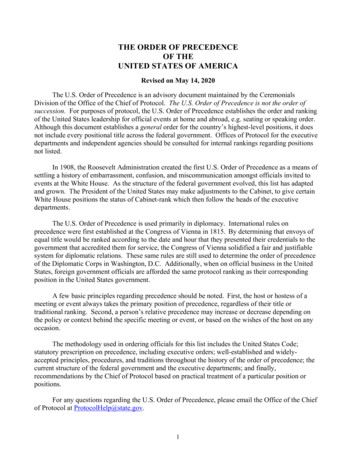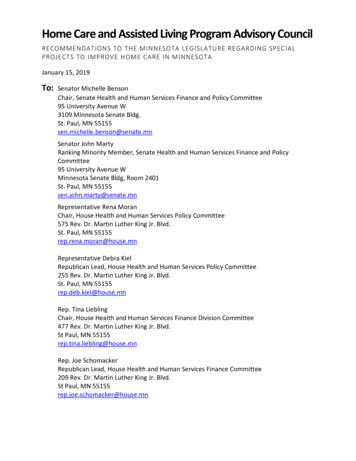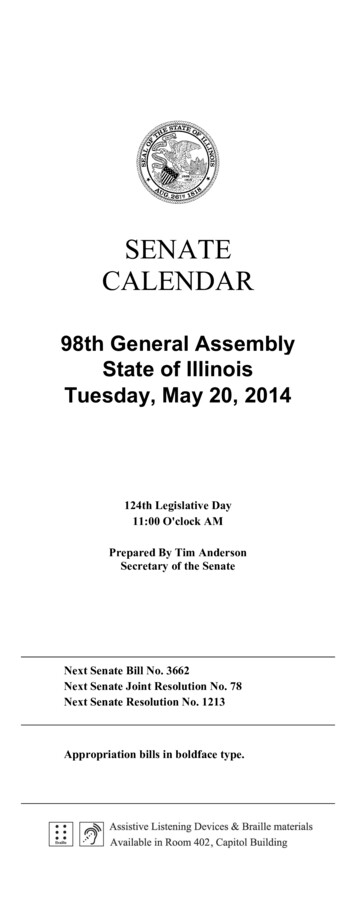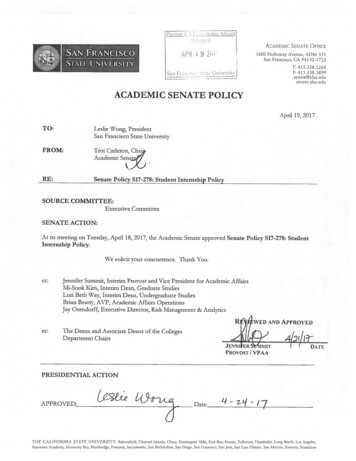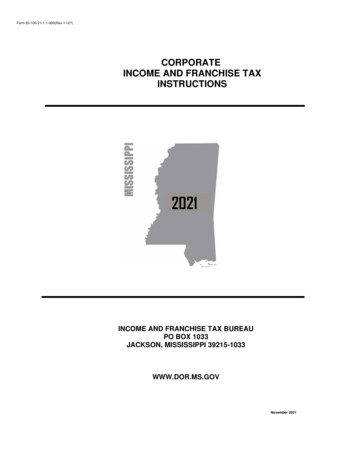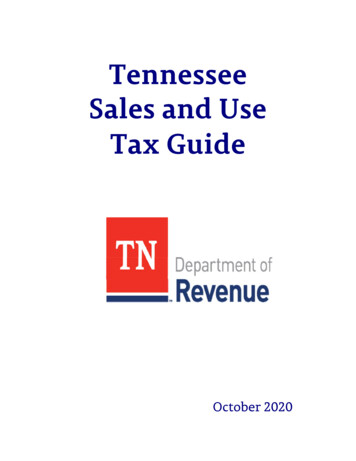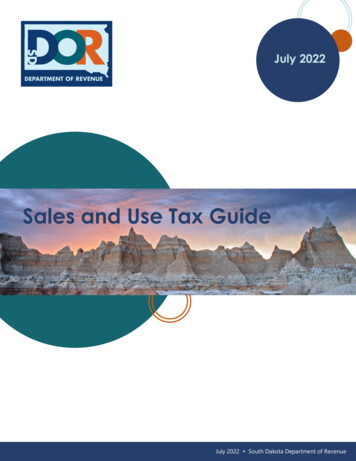
Transcription
Tax News & ViewsCapitol Hill briefing.June 17, 2022In this issue:Senate taxwriters look to tax code to battle rising prices. 1Hungary blocks implementation of OECD global minimum tax . 5House Appropriations panel OKs 1 billion FY 2023 budget bump for IRS. 6Ways and Means Republicans renew push to delay implementation of foreign tax credit regs . 8Finance Committee mulls remote sales tax collection compliance issues post-Wayfair . 9Rice’s primary loss opens up GOP vacancy on Ways and Means in 2023. 11Senate taxwriters look to tax code to battle rising pricesJust days after a hearing with Treasury Secretary Janet Yellen that focused in large measure on currently highinflation levels, a handful of Democrats and Republicans on the Senate Finance Committee outlined separatetax proposals this week that they argue would help tame rising prices. But even though the ideas appearunlikely to advance in the evenly divided Senate, they could be indicative of future policymaking efforts on thepanel depending on the outcome of this November’s mid-term elections.Tax News & ViewsJune 17, 2022Page 1 of 12Copyright 2022 Deloitte Development LLCAll rights reserved.
Wyden: forthcoming bill will target ‘excess profits’ of oil companiesOn the Democratic side of the aisle, Finance Committee Chairman Ron Wyden of Oregon told Politico in astatement on June 14 that he will be rolling out a proposal in the coming weeks that would seek to rein in highgasoline prices by levying a 21 percent tax—that is, effectively doubling the top corporate rate—on the“excess” profits of oil and gas companies with over 1 billion in revenue.As described, the forthcoming legislation would define “excess profits” as profits over and above a 10 percentreturn on expenses—an approach that differs from other recent legislative proposals in this arena in that itfocuses on margins rather than keying excise tax calculations off of oil prices.According to Wyden, the proposal also will call for: Imposing a 25 percent excise tax on stock repurchases by large oil and gas companies—far above the 1percent buyback tax included in the House-passed version of Democrats’ Build Back Better legislation,which is currently stalled in the Senate—andEliminating the last-in-first-out (LIFO) inventory accounting method, which would trim companies’ability to deduct the cost of their most recently added, and highest-cost, inventory prior to older, andoften lower-cost, layers.According to a Wyden spokesperson, the “excess profits” tax and the stock buyback tax would apply only tolarge oil and gas companies—again, those with annual revenue over 1 billion. At press time, it remainedunclear whether the proposed LIFO elimination would apply generally or only to those same large fossil fuelfirms.In his statement, Wyden said the proposal “would help reverse perverse incentives to price gouge by doublingthe corporate tax rate on companies’ excess profits, eliminating egregious buybacks, and reducing accountingtricks.”Republicans unveil Middle-Class Savings and Investment ActAcross the aisle, a quartet of Finance Committee Republicans—Sens. Charles Grassley of Iowa, John Barrassoof Wyoming, James Lankford of Oklahoma, and Steve Daines of Montana—rolled out the Middle-Class Savingsand Investment Act (text, summary), which they said would blunt taxpayer incentives to consume (which pushup demand and, by extension, prices) by making a series of changes to the tax code that they argue wouldencourage savings instead.URL: https://www.grassley.senate.gov/imo/media/doc/117s - middle-class savings and investment act textpdf.pdfURL: th today’s high inflation, many in the middle class could see most, or even all, of their savings andinvestment gains wiped out by inflation,” Grassley said June 14 on the Senate floor. “Yet, even though aTax News & ViewsJune 17, 2022Page 2 of 12Copyright 2022 Deloitte Development LLCAll rights reserved.
middle-class saver may be losing money in real terms, they are still taxed on all gains and interest income as ifinflation doesn’t exist.”“To help counter the current bias in favor of consumption, I propose subjecting most middle-class savings andinvestment income to zero tax,” Grassley said.Notable incentives: Among other provisions, the bill calls for: Expanding the income levels below which capital gain and dividend income is not subject to tax suchthat taxpayers at or below the 22 percent income tax bracket would not be taxed on such forms ofincome. (In 2022, this would mean that taxpayers with combined wage and investment income below 83,350 for single filers and 178,150 for joint filers would not be subject to tax on capital gain anddividend income. Those thresholds would increase over time as income thresholds for the 22 percentbracket move higher with inflation).Eliminating the marriage penalty under the 3.8 percent net investment income tax (NIIT) by increasingthe income threshold at which the NIIT applies to the investment income of joint filers to 400,000(from 250,000). The income threshold applicable to single filers would remain at 200,000, but bothof the thresholds would be indexed for inflation going forward (a feature that does not apply currently).Excluding the first 300 ( 600 for joint filers) of interest income from taxation.Expanding the so-called “Saver’s Credit” by raising the income limits for single and joint filers belowwhich the maximum 50 percent credit rate applies and by increasing the amount of retirement plancontributions which may be counted as part of the credit’s computation.Paid for by SALT cap extension: According to Grassley, the proposed savings incentives would be fully paid forby extending the 10,000 annual cap on the deduction for state and local income and property taxes (the“SALT cap”) through 2028. As enacted in the Tax Cuts and Jobs Act of 2017 (P.L. 115-97), the limitation isscheduled to expire after 2025.Near-term action unlikely on either proposalAlthough both Democrats and Republicans, at least rhetorically, are united in their feeling that lawmakersshould act to address the current historically high inflation levels—a dynamic that was clearly on display whenTreasury Secretary Janet Yellen recently appeared before the two congressional taxwriting committees todiscuss the Biden administration’s proposed budget for fiscal year 2023—the parties remain far apart on theirproposed legislative solutions, making near-term action appear unlikely. (For coverage of the two budgetrelated hearings, see Tax News & Views, Vol. 23, No. 20, June 10, 2022.)URL: s/Tax/2022/TNV/220610 1.htmlAlthough congressional Republicans have offered few public comments to Wyden’s announcement of hisforthcoming windfall profits tax proposal, they have remained steadfastly opposed to proposals that theyargue would single out the oil and gas industry as a means of lowering gas prices.Tax News & ViewsJune 17, 2022Page 3 of 12Copyright 2022 Deloitte Development LLCAll rights reserved.
“On one hand you and the president both say gas prices are too high, to which I agree,” said WyomingRepublican Sen. John Barrasso during the June 7 Finance Committee hearing with Secretary Yellen. “[B]ut onthe other you are targeting American energy with taxes, and that’s going to result in higher costs forAmericans.”For their part, some congressional Democrats were quick to criticize Sen. Grassley’s proposal to pay for hisplan by extending the SALT deduction limitation beyond 2025.“It’s like low-hanging fruit,” to the GOP, said House Ways and Means Committee member Bill Pascrell, D-N.J.Fellow House taxwriter Don Beyer, D-Va., contended that the Senate GOP proposals to tamp downconsumption by encouraging savings were poorly targeted, and failed to recognize the tendency of lowerincome households to spend more of their income, often by necessity.“Your marginal propensity to spending is much higher” among lower-income households, Beyer said.House taxwriters split on how to improve the economy for womenAcross the Rotunda, meanwhile, Democrats and Republicans on the House Ways and Means Committeeoffered conflicting policy prescriptions during a June 15 hearing to discuss “the burnout epidemic and whatworking women need for a stronger economy.”Taxwriters in both parties agreed with the invited witnesses—all working women who have faced somecombination of childcare and eldercare issues—that increasing access to affordable childcare and paid familyand medical leave is critical to helping women remain in the workforce while addressing family caregivingresponsibilities.Democrats back federal solution: Democratic Ways and Means Committee members argued that theseconcerns should be addressed at the federal level through provisions such as the childcare and paid familyleave programs included in the House-passed version of the Build Back Better Act. They also contended thatanother Build Back Better provision that would permanently extend enhancements to the child tax credit thatwere enacted on a temporary basis in 2021’s American Rescue Plan would provide an important cushion tohelp families meet day-to-day living expenses. (The child tax credit enhancements expired at the end of lastyear.) These and other provisions in the Build Back Better legislation would be offset through increased taxesfalling primarily on large corporations and wealthy individuals.According to Democrats, families seeking help with their caregiving needs should not have to wade throughwhat taxwriter Earl Blumenauer, D-Ore., characterized as a “patchwork” of benefits offered by individualstates, localities, and employers.Republicans seek flexibility: Republicans on the panel were skeptical of what they characterized as a “onesize-fits-all” approach to expanding access to childcare and paid family and medical leave in the Build BackTax News & ViewsJune 17, 2022Page 4 of 12Copyright 2022 Deloitte Development LLCAll rights reserved.
Better Act and argued that Congress should instead find ways to encourage private-sector employers to offertheir own programs and provide incentives for families to pursue caregiving options that are best targeted totheir needs. They also contended that the proposed tax hikes in the Build Back Better Act would bedetrimental to small businesses and exacerbate economic stresses facing families, and they criticized thepresident’s economic policies in general as inflationary.Several Ways and Means Republicans joined ranking member Kevin Brady, R-Texas, in urging passage of theProtecting Worker Paychecks and Family Choice Act, a discussion draft he unveiled last year that, among otherthings, would enhance current-law tax incentives for employers offering childcare and paid family leaveprograms to make it easier for smaller employers to provide these benefits. The proposal also calls creating anew tax-preferred family savings account and enhancing the current-law dependent care flexible spendingaccount rules to help families—particularly those at the lower end of the income scale—pay for caregiving andother expenses.URL: ads/2021/05/OMNI 001 xml-003-FINAL.pdfDon’t forget the FedAnother factor worth mentioning in the context of the current economic outlook is the Federal Reserve’s rolein controlling inflation—something Treasury Secretary Yellen emphasized in her remarks at the taxwritingcommittee hearings to examine the administration’s latest budget blueprint. The Fed this week continued itscampaign to address rising prices by announcing that it would increase the Federal Funds Rate by 75 basispoints.—Alex Brosseau and Michael DeHoffTax Policy GroupDeloitte Tax LLPHungary blocks implementation of OECD global minimum taxFrustrating efforts by the European Union to implement Pillar 2 of last year’s global tax agreement through theOECD, which would impose a 15 percent minimum worldwide tax on large multinational companies, Hungaryexercised its veto during a June 17 vote at a meeting of EU finance ministers in Luxembourg. The move wassomething of a last-minute surprise, with Hungary’s opposition emerging after Poland, which vetoed the lastattempt to reach EU unanimity over the minimum tax, indicated earlier in the week that it would support theproposal.EU directives require approval by all 27 member states for implementation, and French Finance Minister BrunoLe Maire had hoped this vote would finally have all on board. (France holds the presidency of the EuropeanCouncil until the end of June, when the Czech Republic will take the gavel.) However, Hungary’s financeminister, Mihály Varga, said that passing the minimum tax at this time would only worsen current economicchallenges.Tax News & ViewsJune 17, 2022Page 5 of 12Copyright 2022 Deloitte Development LLCAll rights reserved.
“Interest rates and inflation are rapidly increasing, supply chains are also disrupted,” Varga said June 17. “Allthese unfavorable developments call for significant losses for businesses and households. Under suchcircumstances, introducing the global minimum tax at such an early stage would cause serious damage to theEuropean economies.”The EU’s failure so far calls into question the fate of the Pillar 2 exercise and is uniquely problematic for theBiden administration as it seeks to have the US conform to Pillar 2 this year by raising the rate on its currentminimum tax—known as the global intangible low-taxed income (GILTI) regime—to 15 percent and applyingGILTI on a country-by-country basis, among other international tax changes. (Those provisions are included inthe Build Back Better Act, the roughly 1.75 trillion tax-and-spending package that cleared the House lastNovember but remains stalled in the Senate.) Congressional Republicans—and some Democrats—have raisedconcerns about having the US implement changes intended to achieve Pillar 2 conformity before othercountries do so, arguing that this will put US companies at a competitive disadvantage. House and Senatetaxwriters recently discussed issues around the OECD agreement with Treasury Secretary Janet Yellen duringhearings to examine the Biden administration’s budget blueprint for fiscal year 2023. (For prior coverage, seeTax News & Views, Vol. 23, No. 20, June 10, 2022.)URL: s/Tax/2022/TNV/220610 1.htmlGOP lawmakers have in recent months argued that they believe the Biden administration should revisitaspects of the global deal, which they say will disadvantage US multinationals. Although more than 140countries signed on to the agreement last October, these lawmakers have said they believe there is still time tochange course because the implementation timeline is already slipping. The June 17 EU vote will likelystrengthen that position in Republicans’ eyes.—Storme SixeasTax Policy GroupDeloitte Tax LLPHouse Appropriations panel OKs 1 billion FY 2023 budget bump for IRSThe House Appropriations Financial Services and General Government Subcommittee on June 16 approved byvoice vote a fiscal year 2023 budget package for the government departments and agencies under itsjurisdiction that would increase topline funding for the Internal Revenue Service by roughly 1 billion over thelevel enacted for FY 2022.URL: 14911/BILLS-117-SC-AP-FY2023-FServices.pdfProgram allocationsThe subcommittee’s proposal would allocate a total of 13.6 billion to the Service for the coming fiscal year, upfrom the 12.6 billion that was enacted for FY 2022 this past March. (For details on the final FY 2022 spendingagreement, see Tax News & Views, Vol. 23, No. 8, Mar. 11, 2022.) But the measure falls short of the 14.1Tax News & ViewsJune 17, 2022Page 6 of 12Copyright 2022 Deloitte Development LLCAll rights reserved.
billion that the Biden administration requested for the agency in its FY 2023 budget blueprint. (For details onthe White House budget blueprint for FY 2023, see Tax News & Views, Vol. 22, No. 28, May 29, 2021.)URL: s/Tax/2022/TNV/220311 1.htmlURL: s/Tax/2021/TNV/210529 1.htmlHere’s how the proposed 13.6 billion in IRS funding in the subcommittee-approved package would beallocated across the agency’s four program areas: Enforcement: 6.1 billion (FY 2022 enacted: 5.4 billion; FY 2023 White House request: 6.3 billion);Taxpayer Services: 3.4 billion (FY 2022 enacted: 2.8 billion; FY 2023 White House request: 3.7billion);Operations Support: 3.8 billion (FY 2022 enacted: 4.1 billion; FY 2023 White House request: 3.8billion); andBusiness Systems Modernization: 310 million (FY 2022 enacted: 275 million; FY 2023 White Houserequest: 310 million).The appropriations package does not include a policy rider sought by a few House Democrats that would haveprohibited the IRS from using its funds to block efforts by states and localities to implement workarounds tothe 10,000 annual cap on the deduction for state and local taxes (SALT) that was enacted in the Tax Cuts andJobs Act of 2017 (P.L. 115-97). Many Democratic lawmakers whose constituents face high state and localincome and property taxes have sought to ease the current-law cap or repeal it outright. But House Ways andMeans Committee Chairman Richard Neal, D-Mass., told reporters June 16 that he would prefer that Congressaddress issues related to the cap through tax legislation rather than through the appropriations process. (TheBuild Back Better Act, which cleared the House last November, would temporarily raise the cap on thededuction to 80,000, but that measure remains stalled in the Senate.)Partisan lightning rodIssues around the IRS’s budget for taxpayer services and business systems modernization have been in thespotlight over the last few months as the agency struggled to complete work on millions of unprocessed paperincome tax returns from tax year 2020 in the wake of COVID-related staffing shortages and facilitiesshutdowns. In recent hearings, Democrats on the two congressional taxwriting committees have contendedthat the backlog resulted from decades of congressionally mandated cuts to the agency’s budget, whileRepublicans have argued the problem is largely the result of misplaced priorities rather than a lack of money.(For prior coverage, see Tax News & Views, Vol. 23, No. 20, June 10, 2022.)URL: s/Tax/2022/TNV/220610 1.htmlThe White House and congressional Democrats also have called for boosting the Service’s enforcement budgetto enhance the agency’s efforts to narrow the “tax gap”—that is, the difference between the amount of taxlegally owed to the government and the amount actually collected. Specifically, they contend that years ofbudget cuts left the Service with a dearth of experienced auditors to handle the increasingly complex returnsTax News & ViewsJune 17, 2022Page 7 of 12Copyright 2022 Deloitte Development LLCAll rights reserved.
filed by large corporations, passthrough businesses, and wealthy individuals, leading to a spike in foregonerevenue.The most recent official estimate from the IRS (covering 2011-2013) puts the gross annual tax gap at 441billion and the net annual tax gap at 381 billion. (The net tax gap is the gross amount less any tax eventuallycollected through enforcement efforts or late payments.) IRS Commissioner Charles Rettig stated in 2021 thatthe gap may now equal or exceed 1 trillion a year, and he recently told members of the House Ways andMeans Oversight Subcommittee that he still stands by that estimate. (For prior coverage, see Tax News &Views, Vol. 22, No. 20, Apr. 16, 2021, and Tax News & Views, Vol. 23, No. 9, Mar. 18, 2022.) Rettig hasindicated that the Service will release an updated estimate later this summer that will cover the period from2014 through 2016 and will include projections for 2019. (For prior coverage, see Tax News & Views, Vol. 23,No. 14, Apr. 8, 2022.)URL: s/Tax/2021/TNV/210416 3.htmlURL: s/Tax/2022/TNV/220318 1.htmlURL: s/Tax/2022/TNV/220408 1.htmlAddressing the proposed increase in the Service’s enforcement budget, Appropriations Committee Chair RosaDeLauro, D-Conn., stated at the subcommittee mark-up that “[w]e are working to finally crack down on bigcorporations and the wealthy who are not paying their fair share of taxes.”Next stepsThe measure now heads to the full Appropriations Committee for consideration. A mark-up by that panel hasnot yet been scheduled.Across the Rotunda, members of the Senate Appropriations Financial Services and General GovernmentSubcommittee have not yet released their own proposed top-line spending numbers for the IRS.—Michael DeHoffTax Policy GroupDeloitte Tax LLPWays and Means Republicans renew push to delay implementation of foreign taxcredit regsRepublicans on the House Ways and Means Committee sent a letter to Treasury Secretary Janet Yellen on June16 renewing their call for a delay in implementing foreign tax credit final regulations that were issued late lastDecember and took effect on March 7 of this year.URL: 06.1635.pdfTax News & ViewsJune 17, 2022Page 8 of 12Copyright 2022 Deloitte Development LLCAll rights reserved.
Business organizations have raised numerous concerns with the final regulations since January and haverequested a one-year delay in their implementation. (For prior coverage, see Tax News & Views, Vol. 23, No.16, May 6, 2022.) Under questioning from members of the House Ways and Means Committee and the SenateFinance Committee during two recent hearings to examine the Biden administration’s FY 2023 budgetblueprint, Yellen said she does not expect that Treasury will extend the implementation date; however, shesaid that some changes to the final regulations could be applied retroactively—a response that left sometaxwriters dissatisfied. (For prior coverage, see Tax News & Views, Vol. 23, No. 20, June 10, 2022.)URL: s/Tax/2022/TNV/220506 3.htmlURL: s/Tax/2022/TNV/220610 1.htmlIn their letter, Ways and Means Republicans requested that implementation date be pushed to January 1,2023, explaining that unresolved questions about the new rules continue to present challenges for taxpayers.“Treasury’s delay in providing necessary clarifying guidance has levied undue burdens on taxpayers attemptingto comply with the final regulations. Lack of clarity in the final regulations has undermined the integrity ofpublic financial reporting and affected investment decisions. These problems are compounded each fiscalquarter that guidance is delayed and businesses and financial auditors try to guess Treasury’s final landingspot,” the letter said.—Michael DeHoffTax Policy GroupDeloitte Tax LLPFinance Committee mulls remote sales tax collection compliance issues postWayfairFour years after the Supreme Court ruled in South Dakota v. Wayfair that states could require remote sellerswith no physical nexus to collect and remit sales taxes on in-state transactions, the Senate Finance Committeeon June 14 held a hearing looking at the impact the decision has had on small businesses and heard numerousrecommendations about ways to limit the complexity and costs associated with complying with the decision.URL: https://www.supremecourt.gov/opinions/17pdf/17-494 j4el.pdf‘Accounting Houdinis’Both Chairman Ron Wyden, D-Ore., and top Republican Mike Crapo of Idaho advocated greater consistencyacross states—including on thresholds for determining when businesses become responsible for sales taxcollection—and sought to understand from the small businesses who testified at the hearing the most costlyand burdensome aspects of compliance they have experienced since 2018.Tax News & ViewsJune 17, 2022Page 9 of 12Copyright 2022 Deloitte Development LLCAll rights reserved.
Wyden noted that small-business executives have had to become “accounting Houdinis” to meet therequirements of the District of Columbia and the 45 states that impose sales taxes—not to mention thethousands of individual jurisdictions within states.RecommendationsWitnesses John Hennessey of New Hampshire-based Littleton Coin Company and Michelle Huie of Montana’sVIM & VIGR Compression Legwear agreed that, in addition to uniformity around nexus criteria, a single salestax rate per state would be a key improvement for small businesses, as would uniform product classificationsacross and within states, and protection from retroactive tax bills.Reducing complexity: Huie walked the committee through the compliance process she has faced over the pastfour years—despite operating in a state with no sales tax. That process, she explained, includes (1)determining that her business met the nexus threshold in 22 states (some with hundreds of jurisdictions), (2)registering with the revenue departments of each, (3) collecting taxes from customers, and (4) remittingpayment to each state at varying time intervals. To help alleviate the out-of-pocket costs for businesses likehers, including the costs for technology necessary to track and comply with the laws of all the jurisdictions,Huie also recommended a centralized clearinghouse for e-commerce companies to register and pay sales taxacross the states.Liability protection: Because of the complexity involved in complying with the decision, Hennessey furtherrecommended that small businesses receive liability protection from state penalties for improper payments ifthe company has made a good-faith effort to comply with the applicable rules for sales tax collection.Streamlined Sales Tax project: Craig Johnson of the Streamlined Sales Tax Governing Board (SSTGB), whichrepresents 24 member states that have simplified their sales tax systems through conformity with aStreamlined Sales and Use Tax Agreement, told the panel that his organization provides a central registrationsystem, certain liability protections, and common definitions that can alleviate some of the burden forcompanies and that it is looking at developing a central filing portal. These solutions, of course, do not addresscompliance issues in the 21 states that have not joined the project.In response to questions from Crapo and Sen. Ben Cardin, D-Md.—who also chairs the Senate Committee onSmall Business and Entrepreneurship—Johnson and Diane Yetter, a board member of the SSTGB’s BusinessAdvisory Council, agreed that it would be helpful for Congress to incentivize states to join the StreamlinedSales Tax project, as this would provide additional consistency for taxpayers but allow states to retain theirsovereignty.Eliminating retroactive collection requirements: Chairman Wyden and Senate taxwriter Maggie Hassan, DN.H., advocated for the Online Sales Simplicity and Small Business Relief Act of 2019 (S. 2350), a proposal theyintroduced in the last Congress with their delegation colleagues Sens. Jeanne Shaheen, D-N.H., and JeffMerkley, D-Ore., that sought to prohibit states from retroactively imposing sales tax collection duty on remotesellers. (The senators have not reintroduced the legislation during the current Congress.)Tax News & ViewsJune 17, 2022Page 10 of 12Copyright 2022 Deloitte Development LLCAll rights reserved.
URL: e-bill/2350/textGAO reportJames McTigue Jr., of the Government Accountability Office, which issued a report June 14 titled Remote SalesTax: Initial Observations on Effects of States’ Expanded Authority (GAO-22-106016), told the committee thatremote sales tax now accounts for about one-third of sales tax revenues in the 45 states and District ofColumbia that have a sales tax.URL: e SixeasTax Policy GroupDeloitte Tax LLPRice’s primary loss opens up GOP vacancy on Ways and Means in 2023House Ways and Means Committee Republicans are looking at another opening on their roster in 2023 aftertaxwriter Tom Rice of South Carolina lost his June 14 primary race to state Rep. Russell Fry.Rice was elected to his first term in Congress in 2012 and joined the Ways and Means Committee in 2015. Hebecame ranking member of the Oversight Subcommittee—his first leadership post on Ways and Means—thispast January.Rice’s primary loss creates the second known GOP vacancy on the taxwriting panel when the 118th Congressconvenes next January. Ranking member Kevin Brady, R-Texas, announced in April that this would be his finalterm in office.Ways and Means Committee Democrats face several changes to their own line-up next year: Democratictaxwriters who have opted not to seek re-election to Congress in 2022 include Reps. Ron Kind of Wisconsin,Tom Suozzi of New York, and Stephanie Murphy of Florida.—Michael DeHoffTax Policy GroupDeloitte Tax LLPTax News & ViewsJune 17, 2022Page 11 of 12Copyright 2022 Deloitte Development LLCAll rights reserved.
This document contains general information only and Deloitte is not, by means of thisdocument, rendering accounting, business, financial, investment, legal, tax, or otherprofessional advice or services. This document is not a substitute for such professionaladvice or services, nor sho
83,350 for single filers and 178,150 for joint filers would not be subject to tax on capital gain and dividend income. Those thresholds would increase over time as income thresholds for the 22 percent bracket move higher with inflation). Eliminating the marriage penalty under the 3.8 percent net investment income tax (NIIT) by increasing
